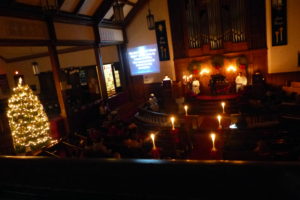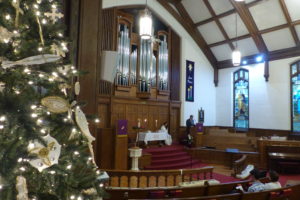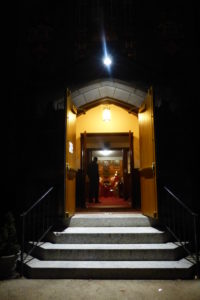Rev. Catherine E. Williams – The Gift of Love: 1 John 4:7-12




This evening we are featuring lavender, butterflies, and love. I confess I don’t know that I can string these together with sufficient credibility. Our Stephen Ministers got together earlier this year to brainstorm what we would like this evening to look like; we ended up with lavender, butterflies, and love. There is a great amount of symbolism in each of these elements, and I hope you can connect with any or all of these themes – according to your preference or your need. But for my short reflection this evening, as I inhale the calming fragrance of lavender, and enjoy the visual inspiration of the colored butterflies, I want to take advantage of the reflective, contemplative nature of this service and think for a little while about love as a gift.
The gospel reading begins with the apostle encouraging us to love one another because love is who God is, and if we say we are people of God we are pretty much saying we are people of love. And yes, I’d be the first to acknowledge that some people and some situations make it much easier than others for us to respond as people of love. But think with me for a moment about a time when you received love from another person, a time when you felt loved. What was that like? Was it the time you sat across from a grandchild who suddenly looked up, caught your adoring eyes, and blew you ten kisses? Was it a time when you were at one of your lowest moments and got an unexpected phone call, note, or text message that said someone was thinking about you? Was it the expression on the face of someone whom you knew was just as in love with you as you were with her or him? Was it the meals, cards, calls, flowers, or other signs of care that you got while you were sick? Was it the earthy smell of someone who reminded you of your granddaddy who always told you, you were his favorite? Whatever it was, I’m guessing it stirred something deep inside of you that made you feel valued, accepted, uplifted, and cared for, among other things. Love, in whatever form, does something to us; it touches the image of God in us and puts a little shine on it, it reminds us who we are, it can sometimes change how we see ourselves.
Love, in God’s dictionary, is not an abstract idea. It doesn’t stay in the feeling zone, or simply roll around in the mind. God’s kind of love is active. It extends itself outward, it shifts its center of gravity to include others. Isn’t that what God did in sending Jesus Christ to earth? God so loved the world that God extended himself outward in becoming like one of us. That’s why Christmas in so many different ways, is about giving and receiving love; to me the gifts only really matter if they are expressions of love. And it’s a good thing God’s love didn’t come to us in a limousine or a private jet, else we’d have reason to be suspicious about whether it was really meant for everybody. No, God’s love entered the world in the lowliest of ways so everyone – from the least to the greatest – could see it, could hold it. Whether shepherd or king, whether carpenter or priest – God’s love is available to all.
 So I’m recommending that we keep our eyes and ears open for the ways in which God’s love comes to us during this season? I have to say that just like the paradox of a Messiah in a manger, God’s love comes to us in unexpected ways. Yes, it would be nice to get a phone call from that estranged son or daughter, but let’s not miss God’s love in that unexpected gesture from a friend or coworker that somehow moved us. Yes it would have been nice to be staring out the window at lush green leaves warmed by Florida’s summery sun, but let’s not miss the glorious glow of a wintery New Jersey sunset that leaves a glow around our heart. I’m inviting us to be a little more mindful this Christmas, a little more open to the myriad ways in which God’s gift of love is born into our lives again and again. Continue reading “Longest Night Service – December 20, 2016”
So I’m recommending that we keep our eyes and ears open for the ways in which God’s love comes to us during this season? I have to say that just like the paradox of a Messiah in a manger, God’s love comes to us in unexpected ways. Yes, it would be nice to get a phone call from that estranged son or daughter, but let’s not miss God’s love in that unexpected gesture from a friend or coworker that somehow moved us. Yes it would have been nice to be staring out the window at lush green leaves warmed by Florida’s summery sun, but let’s not miss the glorious glow of a wintery New Jersey sunset that leaves a glow around our heart. I’m inviting us to be a little more mindful this Christmas, a little more open to the myriad ways in which God’s gift of love is born into our lives again and again. Continue reading “Longest Night Service – December 20, 2016”
 What’s it like to come to Mid-week Lenten Worship at Princeton UMC? The 30-minute services are Tuesdays from noon to 12:30 in the small chapel; entering by the ramp door.
What’s it like to come to Mid-week Lenten Worship at Princeton UMC? The 30-minute services are Tuesdays from noon to 12:30 in the small chapel; entering by the ramp door.




 So I’m recommending that we keep our eyes and ears open for the ways in which God’s love comes to us during this season? I have to say that just like the
So I’m recommending that we keep our eyes and ears open for the ways in which God’s love comes to us during this season? I have to say that just like the 
 Our Longest Night service is a worship gathering — we commemorate the birth of Christ in a manner more subdued than the typically festive Christmas services.
Our Longest Night service is a worship gathering — we commemorate the birth of Christ in a manner more subdued than the typically festive Christmas services. It is no secret that some of the pastoral staff have a passion for Disney (sneak a peek at Jana’s phone case or her computer sometime, or ask Scott how many days until his next family trip to Disney World [388 days as of writing]). So it is exciting when we can take an important topic and wrap it in a Disney package. In the recent Disney movie
It is no secret that some of the pastoral staff have a passion for Disney (sneak a peek at Jana’s phone case or her computer sometime, or ask Scott how many days until his next family trip to Disney World [388 days as of writing]). So it is exciting when we can take an important topic and wrap it in a Disney package. In the recent Disney movie